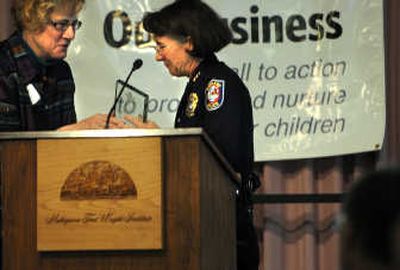A call to action, collaboration

It takes “he-roes” and “she-roes.”
That’s what Mary Ann Murphy said about the people who organized the kickoff breakfast for April’s Our Kids: Our Business campaign. But that statement also applies to preventing child abuse.
“I want all of you here this morning to go out and tell another 10 people about what we are doing,” said Murphy, executive director of Partners of Families with Children and the Spokane Prevention of Child Abuse and Neglect Council. “Spokane excels in collaboration – Our Kids: Our Business is great example of that.”
Nonprofit organizations, social workers, law enforcement, educators and media partners came together for the first time last year to focus attention on child abuse and neglect. Our Kids: Our Business took shape in April as a call to action to protect and nurture children in the Spokane and Coeur d’Alene area.
Friday morning’s breakfast at Mukogawa Fort Wright Institute was the Spokane kickoff for this year’s campaign.
Before Seattle Chief of Police Gil Kerlikowske delivered the morning’s keynote presentation, the Washington state Court Appointed Special Advocate program gave its annual David W. Soukup Speak Up For a Child Award to Spokesman-Review Editor Steven A. Smith. The newspaper last year printed a front-page story every day in April to emphasize Child Abuse Prevention Month and start the Our Kids effort.
“Things like this don’t happen to newspaper people,” Smith said after accepting the award. “We’re taught that journalists are supposed to observe the community, not be part of the community. But sometimes journalists become part of the solution by the quality of the journalism they do.”
Smith dedicated this year’s Our Kids: Our Business campaign to 6-month-old Nevaeh Alana Miller, who died a week ago. Her mother’s boyfriend is charged with murder.
“Last year, it was Summer Phelps,” a 4-year-old Spokane girl who died March 10, 2007, allegedly as the result of prolonged abuse. “I hope we don’t have to mention another child at this time next year,” Smith said.
The Spokane Prevention of Child Abuse and Neglect Council, or SPO-CAN, gave its annual award to Spokane Police Department and Spokane County Sheriff’s Office units that investigate child abuse, neglect and drug-endangered children.
“I was a member of the meth lab team, and as a first responder I got firsthand knowledge of what those children have to go through and live through,” Sheriff Ozzie Knezovich said. “Quality education is the most important thing for a child’s future – we’ll never know how many of these children could have been the next Einstein.”
Kerlikowske, the visiting police chief, praised community efforts. “I don’t think we could do this in Seattle, with such a breadth and depth as you do here,” he said. Nearly 90 percent of police work is social work, Kerlikowske said, and it’s often the child abuse and neglect cases that officers can’t forget.
“Years ago, I was standing in an emergency room in St. Petersburg looking at a little 2-year-old girl who died a painful death from abuse in her home,” he said. “After 35 years of service, that is the case I remember.”
Kerlikowske is the board chairman of Fight Crime: Invest in Kids, a bipartisan, national, nonprofit organization based in Washington D.C. and composed of more than 3,000 law officers, prosecutors, activists and survivors of violence. It advocates for programs to stop bullying, create better after-school programs and provide access to quality child care for preschoolers.
“There is some good news: For every dollar invested in early childhood education, you save $16 later on,” Kerlikowske said. “Kids don’t vote, so who – other than us here – is going to advocate for them?”
He said Fight Crime: Invest in Kids polled police chiefs across the nation about their funding priorities. “The chiefs wanted more money for early childhood programs, not guns, not patrol officers,” Kerlikowske said. “It makes sense to help at-risk parents become better parents, to help their kids.”
Answering a question from the group about how to obtain better state funding for child-abuse prevention programs, Kerlikowske said: “You have powerful voices when you team up.”